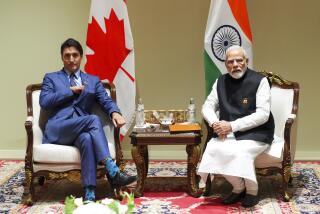Pakistan plays double game when it comes to militants, analysts say
Reporting from Islamabad, Pakistan, and Washington —
Friend. Foe. Or both.
Osama bin Laden’s use of the military city of Abbottabad as his final hide-out aggravates a familiar suspicion among U.S. policymakers: that Pakistan paints itself as a reliable ally against militants even while officials help some of them behind the scenes when it suits their interest.
Pakistan’s security establishment and government have always vehemently denied playing such a double game, particularly in the case of Bin Laden and other Al Qaeda figures.
But analysts say Pakistan’s willingness to reach an accommodation with militants who further its national aims is a cornerstone of the country’s regional strategy, and is unlikely to change. Just as constant is its mutual dependence with the United States, despite a long history of anger and frustration. Pakistan needs U.S. aid; Washington needs Pakistan’s help winding down the war in Afghanistan.
Photos: Osama bin Laden’s death
And U.S. officials do not want to see Pakistan turn into a failed state that is home to both a broad array of extremist groups and an arsenal of nuclear weapons.
“No one has any illusions about this alliance, especially now,” said a senior U.S. military officer. “But the reality remains: We are much more likely to achieve our aims by working with them where we can.”
U.S. officials have refrained from directly accusing Pakistani security forces of harboring Bin Laden, but they say he could not have remained hidden so long without a network of supporters, possibly within Pakistan’s largest intelligence agency, the Inter-Services Intelligence directorate, or ISI.
Pakistan, in turn, lashed out at the U.S. on Tuesday for conducting the raid that killed Bin Laden without first seeking permission. “Such actions undermine cooperation and may also constitute a threat to international peace and security,” the Foreign Ministry said.
Some U.S. lawmakers have raised the prospect of trimming back billions of dollars in economic and military aid Washington has pledged to Pakistan.
“The usual U.S. pattern is to delay the aid by raising accountability issues,” said Lahore-based security analyst Hasan Askari Rizvi. “Still, I don’t expect the Pakistani military to change its dual policy of taking action against some militant groups, while giving space to others.”
Pakistani officials say they regard Al Qaeda as being every bit as dangerous as the Americans do, and point out their role over the years in apprehending a number of key figures. Among them was Khalid Shaikh Mohammed, who claims to have planned the Sept. 11 attacks.
Its approach to other groups is more nuanced. Pakistani intelligence agencies are widely suspected of keeping close relations with groups that target rival India, including Lashkar-e-Taiba, which is accused of organizing the attack on Mumbai in 2008 that killed 166 people.
One of the best examples is its handling of the Al Qaeda-allied Taliban factions that maintain strongholds in the country’s tribal regions along the Afghan border.
The army has launched offensives against the Pakistani Taliban, a homegrown insurgency that directs most of its attacks on security installations, mosques and markets within Pakistan. But it leaves untouched factions such as the Haqqani network, which focuses its attacks exclusively on U.S., NATO and Afghan security forces in Afghanistan.
Most observers believe Pakistan maintains ties with the Afghan Taliban and the Haqqani network with an eye to the future.
Pakistan hopes to exert increased influence on Afghanistan once the U.S. completes its military withdrawal in 2014, and it expects both of these insurgent organizations to play vital roles in Afghanistan’s future. But many Pakistanis also fear that any offensive against the Haqqani network would cause militant groups in the tribal areas to unleash violence within Pakistan.
“It’s the right policy,” said Zafar Hilaly, a former Pakistani ambassador to the U.S. “If we go after the Haqqani network, that will push the Haqqanis and the Pakistani Taliban together. They have the ability to soft-target Pakistani cities and civilians. Do you want us to go bombing people who will cause mayhem?”
Though it’s clear that the U.S. and Pakistan have divergent interests, experts doubt that either side would ever allow the relationship to break down completely.
Ultimately, the U.S. needs Pakistan’s cooperation in bringing an end to the war in Afghanistan. Pakistan has largely cooperated with CIA drone strikes on militants near the Afghan border, and many of the military supplies bound for U.S. and other North Atlantic Treaty Organization troops in Afghanistan transit Pakistan.
Pakistan’s economy could not survive a cutoff in aid from the U.S. Beyond a five-year, $7.5-billion economic and military aid package that Washington has pledged, the U.S. also wields strong influence over the International Monetary Fund, the World Bank and other international lending institutions to which Pakistan owes billions of dollars.
“Both sides need each other for different reasons,” Rizvi said. “They will pressure each other, but they won’t take the relationship to the breaking point.”
Sen. Dianne Feinstein (D-Calif.), chairwoman of the Senate intelligence committee, on Tuesday joined a growing number of lawmakers from both parties calling for the U.S. to reevaluate aid to Pakistan. Speaking to Los Angeles business leaders during their annual lobbying trip to Washington, she said she believes Pakistan has “walked both sides of the street.”
But Hilaly said he doubted that U.S. lawmakers would follow through with any threat to cut back funds to Pakistan, largely because a large chunk of that money would go to tackling the South Asian country’s severe power shortages and building new hospitals and schools, projects meant to revitalize a moribund economy and improve the lives of ordinary Pakistanis.
Cutting off that aid would inflame anti-American sentiment in a country already intensely suspicious of Washington’s intentions.
“It would be counterproductive for Congress to wash its hands of Pakistan, or to sanction or penalize Pakistan, knowing that people of Pakistan have nothing to do with [Islamabad’s policies],” Hilaly said.
Pakistan has denied having any knowledge of Bin Laden’s whereabouts. “He was not anywhere we had anticipated he would be, but now he is gone,” President Asif Ali Zardari said in an opinion piece published in Tuesday’s Washington Post. “Pakistan had as much reason to despise Al Qaeda as any nation. The war on terrorism is as much Pakistan’s war as it is America’s.”
Ignorance of Bin Laden’s whereabouts may be Pakistan’s best defense when it comes to Washington. But it’s not going down well with the Pakistani public, which expects more from its military establishment. And in any case, many in Washington doubt the picture is that clear cut.
“It’s either someone was aware [of Bin Laden’s whereabouts] and didn’t pass it along, or the ISI decided it didn’t want to know, or gross negligence by the police and military,” said a former U.S. Defense Department official who recently left the government and has familiarity with recent American intelligence assessments of Pakistan.
A senior Pakistani intelligence official who spoke on the condition of anonymity called allegations that Pakistan knew where Bin Laden was “hogwash.”
“Had we known he was there, we would have captured him ourselves,” the official said. “Just imagine for an instant what impact it would have on the image of Pakistan in the U.S., which at the moment is at its lowest, had we captured him and handed him over to the U.S.”
“Yes, it slipped from our radar,” the official added. “Yes, that can be embarrassing. But it’s not something that should be held against us.”
Photos: Osama bin Laden’s death
More to Read
Sign up for Essential California
The most important California stories and recommendations in your inbox every morning.
You may occasionally receive promotional content from the Los Angeles Times.











